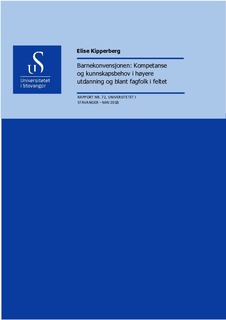Barnekonvensjonen : Kompetanse og kunnskapsbehov i høyere utdanning og blant fagfolk i feltet
Research report
Permanent lenke
http://hdl.handle.net/11250/2568567Utgivelsesdato
2018-05Metadata
Vis full innførselSamlinger
Originalversjon
Kipperberg, E. (2018) Barnekonvensjonen : Kompetanse og kunnskapsbehov i høyere utdanning og blant fagfolk i feltet. Rapport nr. 72, Universitetet i StavangerSammendrag
Background and aim of the report
In order to put the Convention on the Rights of the Child (CRC) into practice, different professional groups, in for instance pre-schools, schools, health system, child protection and social work services, as well as advisors and policy makers on various levels, must have sufficient knowledge and competence regarding the principles and content of the CRC. In their latest supplementary report to the CRC committee, the Childrens’s Ombudsman (2017) comment that professionals who already work with or for childe, have neither sufficient knowledge of the CRC, nor know how to apply the convention in their daily work. A survey carried out by the Giant Leap National Working Group (2015) documented that few public sector employees knew that the CRC has judicial status as Norwegian Law. This situation reveals the demand for higher education institutions to contribute actively in providing systematic training on the CRC.
The CRC committee will examine Norway’s fifth and sixth report on the CRC in May 2018. In light of their upcoming concluding observations and recommendations, the Norwegian government will have to discuss these challenges once again. The aim of this report Competence and Knowledge requirements on the CRC in higher education and among professionals in the field is to contribute to further debates on how to improve competence in this area.
As a starting point, the present report presents information offered to the CRC committee on this topic from Norway’s very first state report in 1993 until today. Previous recommendations from the committee in the period of 1994 – 2010 on training and education of professionals in particular are presented, in order to illustrate the discrepancy between recommendations and how the authorities have followed them up. The report goes on to present seven research projects that have taken place between 1998-2018 concerning training in institutions of higher education, commenting mandate, aims, methodology and findings. Finally, based on findings from research and information presented in various documents, the author makes recommendations for future activities on how to improve knowledge and competence about the CRC among students and professional groups.

